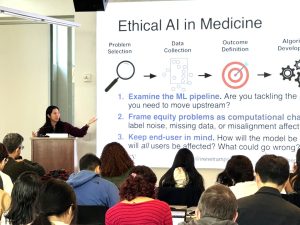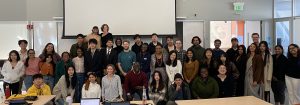by Luis Flores
Berkeley – The Center for South Asia Studies, in conjunction with the Blum Center for Developing Economies, hosted current Pakistani Ambassador to the United States Hussain Haqqani for a discussion on the challenges and opportunities in U.S. and Pakistan relations. Richard C. Blum, a personal friend of the ambassador, introduced Haqqani. “We have probably never had a better ambassador to try and manage what is obviously an interesting and difficult relationship,” said Blum. “To the extent we make progress, the gentleman deserves some credit.” Haqqani, also a scholar and a journalist, led a deeply sobering and academic discussion on the current state of U.S.-Pakistan relations.
“I’ve been ambassador for three and a half years and have only dealt with 364 crisis so far,” joked Haqqani, acknowledging the difficult relationship between the two nations early in his lecture.
Haqqani began by explaining the mutually beneficial relationship between the two governments that began in the 1940s. The ambassador explained that following the Pakistani independence in 1947, the new state was looking for a major supporter while the United States was in search of allies near the Soviet Union. The subsequent mistrust between the two allies is a result of what Haqqani dubbed “parallel narratives.” While the Pakistani narrative of the alliance is one of betrayal and abandonment, the American narrative is one of mistrust and corruption. “The real task of diplomacy is to get people to tamper down their anger and find solutions to the problem,” noted Haqqani.
The Ambassador then drew a connection between the two nation’s historic partnerships during the Cold War to the current one after 10 years of operations in Afghanistan. Haqqani asserted that Pakistan and the United States share the common interest of a stable Afghanistan but differ greatly on strategy. “We think the Americans would benefit more from reconciling various elements within Afghan society, including religious elements that are represented by a segment of the Taliban, not because people like me agree with their world view, but because it’s a part of their society,” explained Haqqani. “Afghans are not going to behave like the 51st state of the American union anytime soon.”
Haqqani’s planned remarks were purposefully brief in order to allow for many audience questions. Almost immediately, a student questioned Pakistan’s own democratic legitimacy. “I think what America leaders seek in Pakistan, which is full and complete democratic rule will come about as our institutions become more assertive and strong,” answered Haqqani, clearly expecting the question. “It’s an evolutionary democracy, not one that will happen overnight.”
Quickly following up on the audience’s concerns over democracy were questions on Pakistan’s non- secular education system. Again, the Ambassador, revealing pragmatic tendencies, stressed the importance of reform as a process. “The damage has already been done,” said Haqqani of those educated in the old system, “they will not change their minds just because a new government has been elected.” The Ambassador likened social progress in Pakistan to the long process of African-American equality in the United States. “[New governments] are moving Pakistan in a way in which the exclusive, hard-lined, narrow interpretation of faith will no longer be the dominant view in the country…Over time, over time,” said Haqqani, reiterating his stress on slow progressive reform.
Questions were often difficult and at times reflective of the American narrative explained by Haqqani. Nevertheless, the Ambassador remained calm, academic and optimistic. “This is a difficult relationship, but it is not yet a broken relationship,” said Haqqani. He closed his lecture by restating something he says to all his American audiences. “America is a great nation, they do a lot of things very well but the two things they don’t do well are patience and history… in the case of Pakistan you need to have patience and you need to understand the insecurities that come from history,” closed Haqqani, surely provoking deep reflection in the audience.





